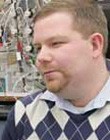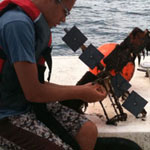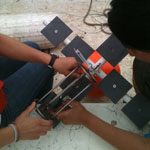|
|
 |
 |
 |
 |
|
 |
10.17.2013
COSEE-IE Student Ocean Film Contest Student Agreement Form
MORE >>
|
|
|
08.21.2013
COSEE-TEK has sponsored two Ocean Science and Technology Days at the Mystic Aquarium that provide scientists the opportunity to broaden the impact of their science to over 3500 visitors annually. COSEE-TEK worked with UConn’s Department of Marine Science to develop 10 exhibits and demonstrations that featured ocean science and the technologies. Post visit surveys have indicated that visitors really enjoyed interacting with the scientists and having hands-on opportunities with the technologies. Click here to download the brochure.
MORE >>
|
 |
07.02.2013
Scientists at the Smithsonian Institution have isolated a chemical compound from bacteria to induce coral larvae to successfully settle.
MORE >>
|
 |
07.02.2013
Integrated Multi-trophic Aquaculture (IMTA) utilizes recycled nutrients to provide more environmental friendly systems to produce a variety of marine organisms. With a growing population, we are eating more seafood and society must make a change to a more sustainable and economic means to provide seafood – such as IMTA systems.
MORE >>
|
 |
07.02.2013
This video describes a little known cause of poor seagrass health – pathogenic infection.
MORE >>
|
 |
06.26.2013
Frequently asked questions about revisions to NSF’s Broader Impacts criterion.
MORE >>
|
 |
 05.02.2013
05.02.2013
Ocean Acidification PowerPoint presentation by Dr. Jeremy Mathis, Director of the University of Alaska Ocean Acidification Research Center, June 2011.
MORE >>
|
 |
05.02.2013
seaHarmony is a collaboration network for ocean scientists, educators, traditional practitioners and resource managers
MORE >>
|
 |
 04.12.2013
04.12.2013
COSEE-TEK’s citizen science based, water quality monitoring project entitled “The Courtship of EVA & BOB” utilizes an easily constructed, cost effective basic observation buoy (BOB) as a floating platform with capacity to carry a suite of environmental sensors for extended periods of time. This document provides detailed information on the preparation, deployment and recovery of the buoy and all associated sensors to help facilitate educators in their local water quality monitoring efforts.
MORE >>
|
 |
 04.12.2013
04.12.2013
COSEE-TEK’s citizen science based, water quality monitoring project entitled “The Courtship of EVA & BOB” utilizes an easily constructed, cost effective basic observation buoy (BOB) as a floating platform with capacity to carry a suite of environmental sensors for extended periods of time. This document provides detailed information on the preparation, deployment and recovery of Ethylene Vinyl Acetate (EVA) passive samplers to help facilitate educators in their local water quality monitoring efforts.
MORE >>
|
 |
03.12.2013
In this contribution we present activities done with final year high school students introducing them to coastal engineering and marine renewables. These activities take place within a day and involve around 30 pupils from around the UK. The workshop includes: an introduction to marine renewables lecture, hands-on marine renewable prototype development and testing, a keynote lecture on coastal processes and structures, and an afternoon boat visit to the Plymouth Sound and the Plymouth breakwater.
MORE >>
|
 |
03.12.2013
Volunteer interpreters play an integral role in communicating ocean science to the public in informal science education settings, such as state parks, aquariums and science centers, and scientists are a valuable source of knowledge and information for training these interpreters. Evaluation data collected by COSEE Pacific Partnerships for the Oregon Coastal Master Naturalist Program highlights the value of engaging scientists as workshop instructors for interpretation audiences, and the challenges faced in attempting to effectively communicate science to those who communicate science with the public.
MORE >>
|
 |
03.12.2013
For Black, Latin American and Native American students, the largest leak in the STEM pipeline occurs between high school and college. We present the Lamont-Doherty Secondary School Field Research Program as a potential model for intervention by research institutions and departments that can (a) improve college attendance, (b) improve STEM recruitment and (c) invigorate teaching practices at this critical educational gateway.
MORE >>
|
 |
03.12.2013
Increasing the number and diversity of students who successfully pursue careers in Ocean Sciences is key to addressing the growing demand for professionals in our fields who genuinely understand and make a contribution to cutting edge research. Summer research programs for undergraduates play a critical role in this process by creating environments in which students can develop the strategies and professional skills necessary to pursue meaningful careers in various STEM fields and by supporting students as they “bridge” between undergraduate and graduate studies.
MORE >>
|
 |
03.12.2013
COSEE-West’s online workshops focus on bridging ocean science research and education and promoting collaborations among ocean scientists, K-12 teachers and informal educators. They provide a venue for scientists to share their research and expertise with educators, who reach an even broader audience of students and public. Educators question, give feedback, and share expertise in classroom application of science.
MORE >>
|
 |
03.12.2013
Ocean Networks Canada (ONC) Observatory, comprised of VENUS and NEPTUNE Canada cabled networks, supports transformative science in coastal and deep sea ecosystems. It enables interactive experiments focused on ocean health, energy resources, natural hazards, and marine conservation for international research collaborations.
MORE >>
|
 |
03.12.2013
Real-time data play an important role in science education by adding relevance to the learning experience, by enabling self-discovery and inquiry, and by providing opportunity for dialogue between students and researchers. Over the past decade, profiling floats (such as Argo) have proven to be excellent platforms for deployment of biogeochemical sensors.
MORE >>
|
 |
03.08.2013
The NERACOOS ocean and weather climate display delivers information about the average weather and ocean conditions between 2001 and 2012. The display also includes information about recent and past years' ocean and weather conditions so that you can compare them to the average conditions from the past decade.
MORE >>
|
 |
02.28.2013
Tapping into multimedia is a sensible way to broaden the impact of your science. But in a world awash with on air and online media, how do you produce content that both holds up and stands out?
MORE >>
|
 |
02.28.2013
Modeled after NSF’s Research Experiences for Undergraduates program, COSEE Florida’s Research Experience for Pre-Service Teachers (REPT) project is an educationally valuable capstone element within the Bachelor’s Degree in Middle Grades Science Education with a Concentration in Ocean Science at Indian River State College (IRSC). In summer 2011, junior and senior level science education majors conducted research with mentors from three local marine research organizations, produced a scientific poster and crafted an educational multi-media presentation.
MORE >>
|
 |
02.27.2013
In 2010-2011 we completed a rigorous field campaign to examine the impact of upwelled Modified Circumpolar Deep Water on the Ross Sea ecosystem. Fully integrated with this science plan was a comprehensive education program designed to introduce new audiences to the experience of Antarctic research and the AUV technology used.
MORE >>
|
 |
02.27.2013
New participatory courses in Marine Sciences are now a central component of the Rutgers undergraduate Marine Science curriculum. The courses use new datasets enabled by ocean observatories, in particular, the interactive exploratory capabilities of underwater gliders. The overall program is designed to increase repeated contact with students similar to the graduate experience.
MORE >>
|
 |
02.27.2013
COSEE NOW reviews their experience in using real-time data in this PowerPoint presentation and comments upon which tools are likely to become increasingly important to their lab in the coming years.
MORE >>
|
 |
|
 |
 |
 |
 |
|
 |
|

